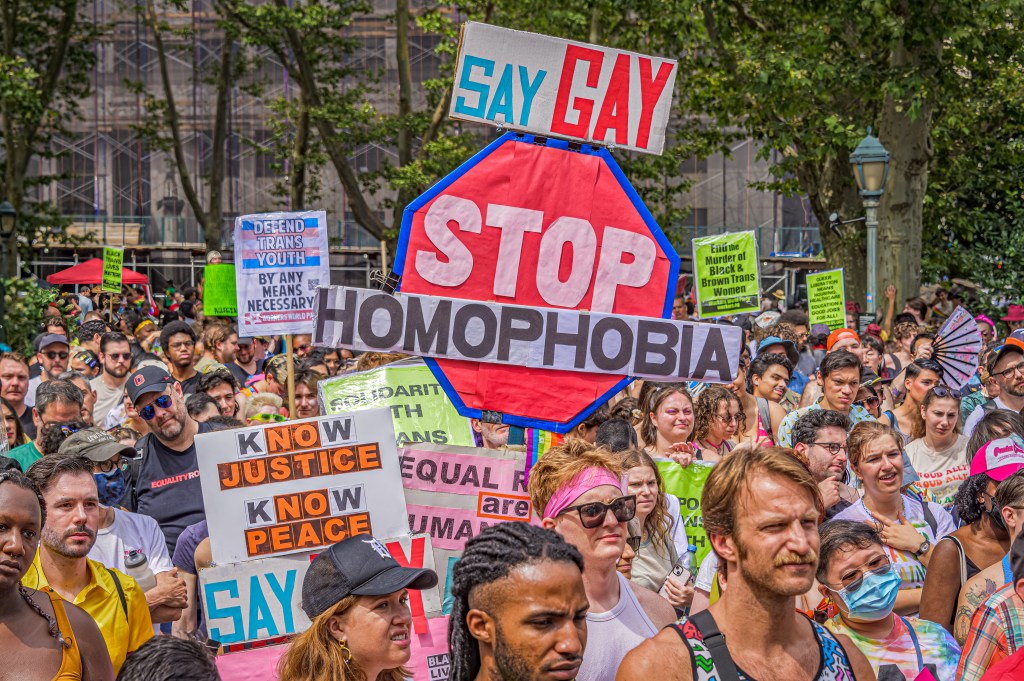One-third of the world still criminalises consensual same-sex acts

A new report reveals the extend of anti-LGBTQ+ laws (Canva)
More than 30 per cent of the world’s countries still criminalise LGBTQ+ people for engaging in consensual same-sex acts, a new report has revealed.
ILGA World’s new flagship publication Laws on Us has documented legal developments in all 193 UN member states, several non-UN member entities and a number of sub-national jurisdictions, between January 2023 and April 2024.
“Our communities celebrated important victories during the past two years,” Lucas Ramón Mendos, research manager at ILGA World and Laws on Us’ lead co-author, said ahead of the report’s publication. “And yet, resistance and detraction have materialised almost everywhere.”
Published just ahead of Pride Month the report showed that 32 per cent of the world continues to criminalise consensual same-sex acts – including 60 UN member states by law and two more de facto.
The report did, however, note several positive steps taken in various countries.
During the past 16 months, four UN member states (Andorra, Estonia, Greece and Slovenia) made marriage equality a reality for LGBTQ+ couples, while Nepal issued an interim order to facilitate such unions, and Bolivia and Latvia legalised same-sex civil unions.

There were also major gains in terms of same-sex acts being decriminalised, including in the UN member states of Singapore, Mauritius and Dominica, and in non-UN member the Cook Islands, in the South Pacific.
In addition, five UN states (Ecuador, Finland, Germany, New Zealand and Spain) and the state of Yucatán in Mexico legalised gender recognition based on self-ID.
Nine UN states now have legal protections against non-consensual interventions on intersex minors – with Chile, Spain and jurisdictions such as the Australian Capital Territory all joining the list since the start of 2023.
But it was not all good news.
Russia and a number of US states have enacted bans on gender-affirming care and actively promote interventions on intersex minors.
Meanwhile, Uganda passed an Anti-Homosexuality Bill, which imposes a possible death penalty, Iraq codified the criminalisation which existed de facto, and reports surfaced of capital punishment being enforced in Afghanistan and Yemen. Alongside this, a number of other UN states have announced regressive bills and/or discussed introducing criminalisation of same-sex relationships.
“We have seen an alarming rise in restrictions on freedom of expression and association,” Laws on Us lead co-author Dhia Rezki Rohaizad said. “This has resulted in censorship arrests and persecution in many UN member states.”

Jordan, Kyrgyzstan and Uganda all implemented laws targeting the “promotion of homosexuality”, while Belarus has started to classify LGBTQ+ content as pornography and Russia labelled what it calls the international LGBT movement as “extremist”.
In recent months, a number of people having been arrested in Russia for allegedly promoting LGBTQ+ rights, with the authorities raiding an “anti-war LGBTQ+ party“, arresting two bar workers and making My Little Pony 18+.
Addressing the findings of the report, Julia Ehrt, the executive director at ILGA World, said: “In 2024, half of the global population will head to the election polls, and states are trying to restrict the civic space for non-governmental organisations, in particular those addressing sexual and gender diversity.
“Even talking about our lives in public is becoming increasingly difficult in a growing number of states. This trend is extremely concerning: history has shown us that the advances our movements have made worldwide are often just an election or a downturn away from being reversed.”
ILGA World co-secretaries general Luz Elena Aranda and Tuisina Ymania Brown added: “Every day, the lives of LGBTI people are used as wedge issues to distract, mobilise and divide. In concerning times like these, it is paramount to have reliable evidence on the laws worldwide affecting our communities and a clear understanding of the challenges that lie ahead and around us.”
How did this story make you feel?

